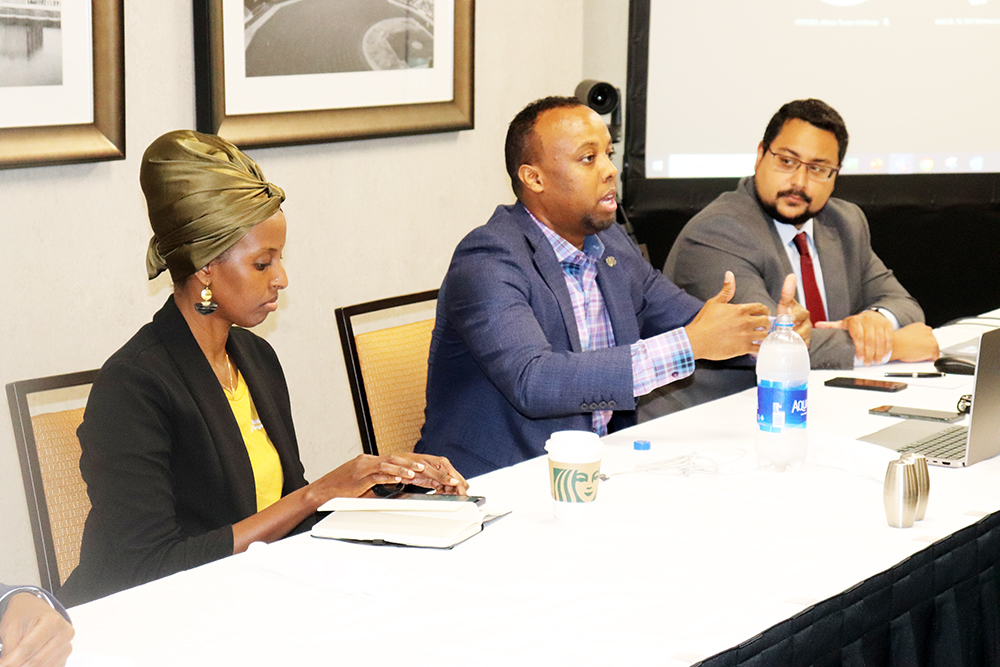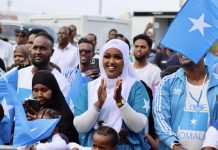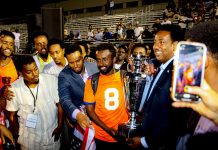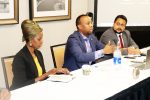
For Somali Americans in Minnesota, the week leading up to the July 4 is not only an opportunity to celebrate the Independence Day of their surrogate nation, but also that of the country they left behind.
This year, the Somali community celebrates 63 years of their country’s independence. Throughout the weekend, Somalis in Minnesota celebrated their country’s independence with a series of events under the banner of “Somali Week” which included panel discussions, and cultural and sports events, hosted by Ka Joog, a Minnesota-based nonprofit that organizes annual celebrations of the east African country’s Independence Day.
On Friday, business leaders, elected officials, and members of the community gathered at the Courtyard by Marriot Hotel in downtown Minneapolis for a town hall discussion themed “Progress and Partnership: Envisioning a Stronger Future for Somalia.”
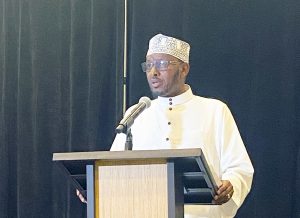
Community leader Sheikh Hassan Jama said that the town hall was a call for unity for all Minnesotan Somalis to think about how they could advance the interests and wellbeing of the Somali diaspora. He explained why thousands of Somalis take part in the annual week-long festivities.
“[Somali Independence Day] is a day that calls for reflection and gratitude,” Jama said. “Our forefathers’ unwavering commitment inspired us to honor their legacy and uphold the values they showed in their struggle.”
Events like Somali Week present opportunities for the community to cast itself in positive light, in a state where people of Somali descent haven’t always been portrayed well.
Despite having a population of more than 86,000 – the most of any state in the United States, according to the nonprofit group Minnesota Compass’s analysis of U.S. Census Bureau data, Somalis in Minnesota have historically met challenges that come with being Black, immigrant, and Muslim.
According to the Somali Week website, the celebration has grown over the years from one block with around 5,000 people, to three blocks and more than 35,000 participants from various backgrounds. Ali Elmi, the board chair of Rising Impact, a nationally recognized Somali-wellbeing organization that coordinates Somali Week, said that leading the planning of the festivities had been rewarding for him.
“These past two weeks I’ve really come to understand all that goes into organizing this great event,” Elmi said.
At the town hall, Kyle DeFreitas, a representative from the World Health Organization (WHO), spoke about the recent COVID-19-imposed challenges that put pressure on Somalia’s health sector. The pandemic exacerbated pre-existing issues in the country, he said.
“The country continues to feel the impact of COVID, on top of other challenges like famine, floods, drought, and cyclones,” DeFreitas said.
Despite the difficulties, DeFreitas acknowledged that Somalia had made significant strides in getting back on track after the pandemic. They included technological advancements to increase access to oxygen and successful vaccination campaigns. A report from WHO detailed the international efforts to improve post-COVID conditions in Somalia, including partnerships with the United Nations Sustainable Development Cooperation Framework to rebuild the health care system and strengthen emergency preparedness.
Rep. Samakab Hussein, a Somali American who represents District 65A in the Minnesota state legislature, recalled fond childhood memories of Somali Independence Day in Minnesota. Each year, he would anticipate the lively cultural activities and parades in his neighborhood, he said. Hussein said the experience shaped his identity as a young Somali American, and believes the celebrations are important in instilling pride for future generations.
“We want to make sure our kids learn where they come from and who they are,” Hussein said.
Another member of the community, Dr. Mursal Khalif, spoke about the business potential of Somalia, highlighting the country’s natural resources as opportunities for trade and economic development. Khalif also mentioned the strides Somalia has made in the tech industry, particularly its ICT sector, according to World Economic Forum.
As more Somalis immigrate to states like Minnesota, the need for robust communications technology available to the diaspora has only increased. However, political instability has stifled progress. Khalif said the solution to the Somali economic standstill was more emphasis on diplomatic relations.
“When people do business together, relationships grow, and we can all benefit from that partnership,” Khalif said.
Mohamed Farah, executive director of Ka Joog, said town halls were necessary to both unite the community and pave a brighter future for Somalia. While a large portion of the discussion addressed Somalia and the ways people can support the country, Farah said it was just as important to discuss the livelihoods of Somalis living in Minnesota, as more continue to settle in the state every year.
“Minnesota is our home, and we aren’t going anywhere,” Farah said.
About Panashe Matemba-Mutasa, Mshale Reporter
Panashe is a general assignments reporter. She is a graduate of the University of Minnesota and a UC Berkeley Graduate School of Journalism Class of 2025.

